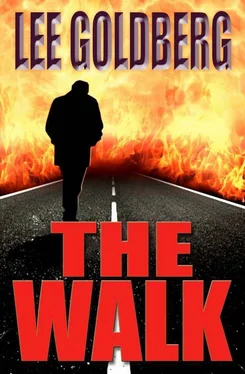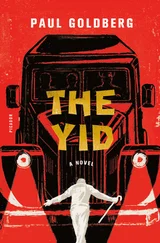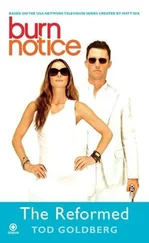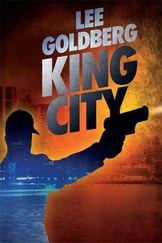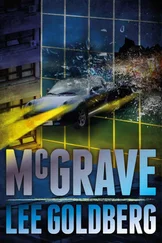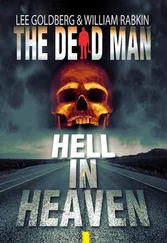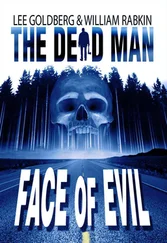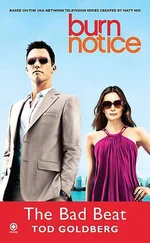Lee Goldberg - The Walk
Здесь есть возможность читать онлайн «Lee Goldberg - The Walk» весь текст электронной книги совершенно бесплатно (целиком полную версию без сокращений). В некоторых случаях можно слушать аудио, скачать через торрент в формате fb2 и присутствует краткое содержание. Жанр: Ужасы и Мистика, на английском языке. Описание произведения, (предисловие) а так же отзывы посетителей доступны на портале библиотеки ЛибКат.
- Название:The Walk
- Автор:
- Жанр:
- Год:неизвестен
- ISBN:нет данных
- Рейтинг книги:4 / 5. Голосов: 1
-
Избранное:Добавить в избранное
- Отзывы:
-
Ваша оценка:
- 80
- 1
- 2
- 3
- 4
- 5
The Walk: краткое содержание, описание и аннотация
Предлагаем к чтению аннотацию, описание, краткое содержание или предисловие (зависит от того, что написал сам автор книги «The Walk»). Если вы не нашли необходимую информацию о книге — напишите в комментариях, мы постараемся отыскать её.
The Walk — читать онлайн бесплатно полную книгу (весь текст) целиком
Ниже представлен текст книги, разбитый по страницам. Система сохранения места последней прочитанной страницы, позволяет с удобством читать онлайн бесплатно книгу «The Walk», без необходимости каждый раз заново искать на чём Вы остановились. Поставьте закладку, и сможете в любой момент перейти на страницу, на которой закончили чтение.
Интервал:
Закладка:
He ignored the crashed cars and the crushed cars and the victims inside them.
He ignored the dazed survivors, most of them elderly Asians, stumbling across his path like drunks, their faces lined and puckered with age.
He ignored the injured and the dead, laid out on the sidewalks like garage sale trinkets on display.
And he ignored the crying, the moaning, and the screaming.
He ignored it all.
There were a thousand Mollys out there, and he didn’t want to meet another one. It was too painful and far too dangerous.
Marty kept his gaze at his feet, following the twisted iron of the long-forgotten railroad track imbedded in the broken asphalt. Or maybe it was an old trolley track. Marty didn’t know and didn’t really care. What little Los Angeles history he knew was gleaned from Dragnet reruns. If Jack Webb didn’t film it, Marty didn’t know it.
He didn’t feel he was missing anything. Los Angeles didn’t have much history anyway and what little it did have was paved over the instant it showed any age, which made sense to him. The only buildings tourists cared about were ones they saw repeatedly on TV or in classic movies, and most of those were facades on studio back-lots. In that regard, he was a learned historian.
Stately Wayne Manor. The Bates Motel. Melrose Place. 77 Sunset Strip. Baywatch headquarters. Jed Clampett’s mansion. The Brady’s house. Gilligan’s lagoon. Cabot Cove. These places were more culturally and emotionally meaningful to LA, and perhaps to most people born after 1950, than the weedy battlefields of Gettysburg, the Liberty Bell, or the White House itself.
Beyond TV and film locations, the most interesting and significant landmarks in the city were as transitory and disposable as the historical record they were printed on-the slim “Maps to the Stars’ Homes” distributed by bored Latinos sitting on folding beach chairs at street corners and freeway off-ramps.
Now they would all have to be replaced by new landmarks.
Marty was passing through Little Tokyo, a fact he wouldn’t have known if the blue sign demarcating the neighborhood wasn’t still standing, canted at a right angle. Now he noticed the Japanese businesses, their signs dangling from crumbling storefronts, or lying broken on the streets. Landwa Food. Mitsuwa Marketplace. Yaohan Plaza. And even through the dust, he could smell the unmistakably salty, greasy, and fishy aroma of Japanese food.
Or perhaps it was just Marty’s imagination, spurred by the pained and perplexed Asian faces, the indecipherable Japanese lettering, the knowledge he was in their tiny, dying corner of a fading urban center.
The railroad track veered off and disappeared into a parking lot on the northwestern corner of 2nd and Alameda. Hundreds of terrified people gathered on the uneven concrete clearing, staring at the buildings they’d escaped from, taking comfort in the arms of their friends and co-workers, the agonized wailing of all those jostled cars drowning out their own.
He moved on, past a pile of sooty brick, rusted iron bars, and corroded metal awnings, all that remained of an abandoned building that had dissolved like a sugar cube hit by a drop of water. A bewildered security guard, presumably there to protect the place from squatters, sat on a stool in his rickety plywood shack, which was barely larger than the man himself. Judging from the look on the guard’s face, Marty guessed he wouldn’t be leaving his tall, narrow shelter any time soon.
The face of the Japanese American Museum had disintegrated, a pile of shattered glass glittering like snow in the wide plaza at Alameda and 1st Street. Marty crossed the intersection and headed west.
Even without a sign, he would’ve known he was in Little Tokyo now. On the south side of the street, a recreation of a wooden watchtower marked the entrance to a mini-mall designed to resemble an authentic Japanese village, at least as it would have been if built by a Winchell’s Donuts franchisee.
The center, or what was left of it, faced a block of historic buildings dating back to the 1880s and the first Japanese settlers, something Marty wouldn’t have known if he wasn’t watching where he stepped. The previous occupants of the buildings, from the 1800s up until World War II, were inscribed in brass letters in the broken, buckled sidewalk as part of some urban art project.
Marty stopped in front of one of the buildings and read the listing: 1890, Queen Hotel. 1910, Nihon Hotel. 1914, T. Kato, Midwife. 1926, Dr. W. Tsukifuji, Dentist. 1935, Ushikawa Hospital. Now it was a video store.
A few steps farther down was Fugetsu Do, the Japanese bakery where the first fortune cookie was created. Marty looked through the shattered window. No one was inside. Perhaps the baker got advance warning from one of his cookies.
Marty continued on, Little Tokyo abruptly giving way to the Civic Center. A sign outside of City Hall announced that the 28-story edifice, familiar to anyone who ever looked at an LA policeman’s badge, was undergoing an extensive seismic retrofitting that obviously came too late. The imposing, phallic tower, thrusting a faux-Greek temple into the heavens, was the official symbol of the city and it was even more so now, snapped in half, lying across the park like a fallen soldier.
But across the street, the ramshackle “World Famous Home of the Authentic Kosher Mexican Burrito” withstood the quake unscathed and was open for business. Steam escaped from the tiny, open kitchen, where the perspiring chef, seemingly oblivious to the disaster, was busily serving meals to the equally oblivious customers at the sidewalk counter.
If Marty limited his view to just the burrito stand, it looked like just another lunch hour, the counter crowded with hungry paralegals, secretaries, and civil servants, munching over-stuffed burritos and chugging huge sodas. The only thing wrong with the picture was that everyone was bleeding from somewhere, their clothes ripped, their bodies covered with dust. But there was no panic here, no moaning, no sobbing. The customers seemed to take great comfort in their familiar burritos, keeping their gaze on the kitchen and away from the shaken world around them.
Without thinking, Marty abruptly turned and headed for the burrito stand. Even though he hated Mexican food, he suddenly had an overpowering urge for a burrito; he didn’t know why. Perhaps it was astonishment that drew him, the discovery of an oasis in the disaster. Then again, he’d never tried a Kosher burrito before, and this was certainly the day for new experiences.
Marty shouldered his way to the counter, pulled down his dust mask, and filled his nostrils with the smell of sizzling fat. Faded, water-stained photos of direct-to-video movie stars and TV character actors hung on the walls, their sun-bleached autographs retraced with a ball-point pen by a shaky hand. Lee Horsley ate here. A place couldn’t have a stronger recommendation than that.
The chef worked frantically, taking orders, serving food, and running the cash register.
“What would you like?” The chef asked with a heavy, Mexican accent.
Marty glanced up at the menu. Besides the Kosher Burrito, and a dozen variations on it, they offered Teriyaki Chicken Burritos for their Japanese neighbors, hamburgers for the bland bureaucrat, and Shrimp Cocktails for the discerning gourmet. What would Lee Horsley have chosen?
“What’s a Kosher Burrito?” Marty asked.
“Pastrami, Hebrew National salami, corned beef, chili sauce, onions, mustard, pickles and peppers wrapped in a home-made tortilla,” the chef replied. “Is very very good.”
All that was missing was a matzo ball and gefilte fish to really make it work.
“I’ll take it,” Marty put four dollars on the counter. “And a coke.”
Читать дальшеИнтервал:
Закладка:
Похожие книги на «The Walk»
Представляем Вашему вниманию похожие книги на «The Walk» списком для выбора. Мы отобрали схожую по названию и смыслу литературу в надежде предоставить читателям больше вариантов отыскать новые, интересные, ещё непрочитанные произведения.
Обсуждение, отзывы о книге «The Walk» и просто собственные мнения читателей. Оставьте ваши комментарии, напишите, что Вы думаете о произведении, его смысле или главных героях. Укажите что конкретно понравилось, а что нет, и почему Вы так считаете.
